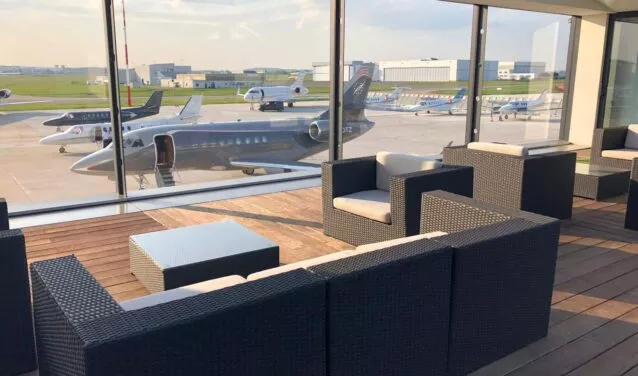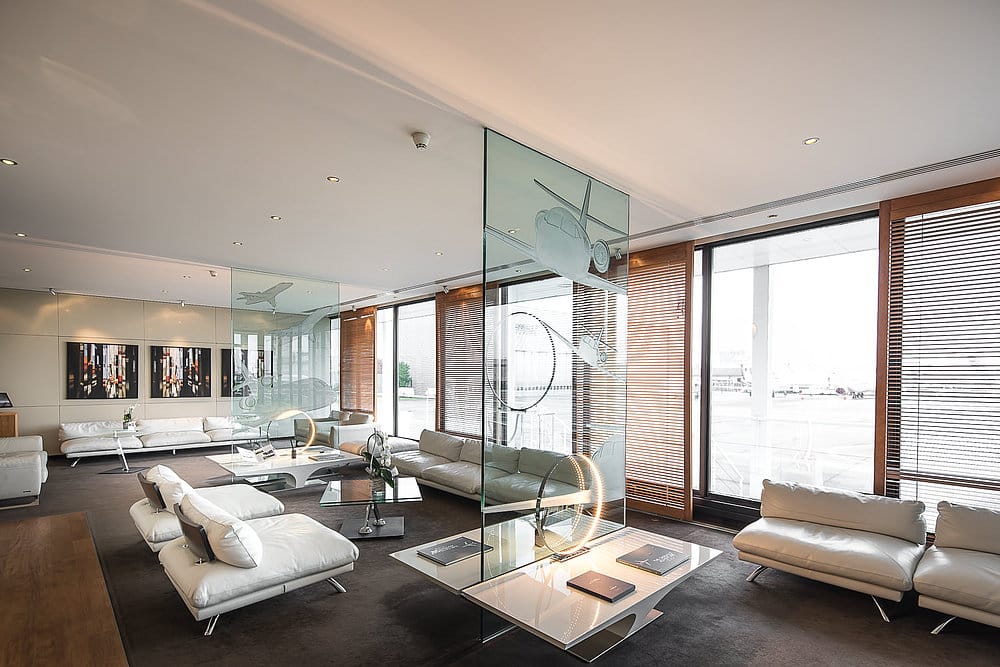
Behind every private jet flight lies a discreet but essential infrastructure: the FBO. A veritable VIP terminal, it offers passengers and crews top-of-the-range, rapid and personalized service, far removed from the constraints of commercial terminals.
Find out all you need to know about these fixed operating bases that are redefining the private jet travel experience.
What is an FBO?
The acronym FBO stands for “Fixed Base Operator”.
In business aviation, FBOs are terminals for private jets and their passengers.
FBOs have a handling mission that can be broken down into two branches:
- The first is to welcome passengers before or after their flight in a dedicated VIP terminal, separate from the terminals for scheduled aircraft;
- The second is to provide airport assistance to private jet airlines. These include on-board crew reception, refuelling, de-icing, maintenance and hangar parking.
There are currently over 17,000 FBOs for private jets worldwide, including 4,000 in the USA.
What’s the difference between an FBO and a commercial terminal?
Travelling through an FBO (Fixed Base Operator) offers a very different experience from that of a conventional commercial terminal. Here are the main differences to bear in mind:
- Waiting times :
- FBO: boarding within 20 minutes of arrival.
- Commercial terminal: lengthy procedures, queues, 1 to 2 hours processing time on average.
- Security :
- FBO: discreet, fast and personalized security and customs checks.
- Commercial terminal: standardized controls, sometimes long and impersonal.
- Comfort and environment :
- FBO: private lounges, quiet atmosphere, attentive staff, upscale services.
- Commercial terminal: public areas often crowded and noisy, limited services.
- Aircraft access:
- FBO: direct access to private jet on foot or via dedicated vehicle.
- Commercial terminal: boarding via footbridge, bus or shuttle.
- Additional services:
- FBO: concierge service, customized catering, meeting rooms, private transfers.
- Commercial terminal: services often limited or available only in business class or at extra cost.
Simply put, choosing an FBO for a private flight means opting for speed, confidentiality and comfort, in a setting totally adapted to the needs of high-end business or leisure travelers.
How are you welcomed at an FBO?
1. Tailor-made service from the moment you book
As an AEROAFFAIRES passenger, you benefit from special attention and tailor-made service at all times.
Once you have booked your flight, we will give you the address of the FBO to which you will need to go before boarding your flight. AEROAFFAIRES can organize your transfers.
If you have a preference, and whenever possible, you can choose which FBO you would like to use.
2. Smooth arrival and personalized welcome
As soon as you arrive at the FBO, you’ll be greeted in front of the entrance by reception staff. Your baggage is immediately taken care of and transferred to your private jet.
Before boarding, you can meet the captain. He can give you details of the flight, the planned itinerary, the weather, and answer any questions you may have.
3. A moment of relaxation in a reserved area
Unlike commercial airports, FBOs offer a quiet, intimate atmosphere. You’re invited to wait in a refined private lounge, with a panoramic view of the tarmac and parked jets.
In these areas, you’ll find :
- comfortable armchairs ;
- fresh drinks, coffees or refined snacks;
- international newspapers and magazines;
- high-speed WiFi connection;
- meeting rooms for working in peace and quiet;
- bathrooms for pre-flight refreshment.
Some larger FBOs can offer concierge services, and look after your children and pets while you wait.
4. Fast service to suit your schedule
In most cases, passengers don’t have to wait, and pass through the FBO very quickly. The advantage of a private terminal is that no time is wasted. The average time between arrival at the FBO and take-off is 20 minutes.
All private jet terminals are able to carry out the necessary security and immigration checks.
If your private jet is parked right in front of the FBO, you’ll get out and walk to it. Occasionally, you may have to take a short drive to the aircraft. In some airports, your cab can also take you right up to the aircraft door.

Photo credit : Dassault
Dassault Falcon Service private terminal lounge (FBO) at Paris-Le Bourget airport.
The main services offered by an FBO
An FBO (Fixed Base Operator) is much more than just a private terminal: it’s a true customized airport service center, designed to meet the requirements of business aviation passengers and crews.
Here are the most common services offered by an FBO:
- Fuel for private jets: supply of Jet A-1 or AVGAS-type fuel.
- Wing de-icing: essential in winter conditions to ensure flight safety.
- Interior and exterior cleaning: complete aircraft maintenance between flights.
- Light maintenance and technical assistance: rapid interventions to ensure aircraft operational availability.
- Customs and immigration services: discreet on-site formalities.
- Top-of-the-range catering service: personalized menus to suit passenger preferences.
- Baggage and cargo management: complete handling, from loading to unloading.
- VIP transport: dedicated transfers for passengers and crew, in luxury cars or minibuses.
- Work and relaxation areas: private lounges, meeting rooms, high-speed Wi-Fi access.
- Parking for personal vehicles: secure long-term parking.
- Airport transfers: you can join or leave the FBO by helicopter or with a private chauffeur.
These services are designed to guarantee optimum comfort, maximum efficiency and absolute discretion, whether you’re a passenger or a crew member.
FBO history
In the 1920s, after the war, many American pilots bought military aircraft at affordable prices. They used them to put on entertaining air shows all over the country, creating “flying circuses”. This was one of the most popular forms of entertainment during the Roaring Twenties. Aviation was in its infancy, and there were few airfields. Pilots flew with mechanics and landed in fields. They had no fixed base.
The passage of the Air Commerce Act in 1926 regulated civil aviation and imposed standards in terms of pilot licensing and aircraft maintenance. Pilots and mechanics had to register as a business with a fixed address. They then set up on airfields to operate their aircraft. This gave rise to the term “Fixed-Based Operators”.
FBOs continued to develop on airfields and airports all over the world. Today, most FBOs in the business aviation sector do not operate their own aircraft, but offer services to private jet airlines and their passengers.
The FBO business sector
The FBO business is correlated with the economic climate and the price of oil, which accounts for a large proportion of FBO revenues.
Like airlines, the FBO market is in the midst of consolidation. The number of players has been falling for 15 years. In the USA, the number of FBOs has fallen by two-thirds since the 1980s.
This consolidation is being driven by existing companies looking to expand their networks. These growth opportunities have made FBOs a prime investment for investors. The majority of acquisitions in recent years have been made possible by private equity financing.
Signature Flight Support is currently the largest player in the market, with over 200 bases of operations worldwide. Medium-sized brands, such as Sky Valet, are succeeding in establishing themselves in niche markets or developing a unique identity.
Paris – Le Bourget is the airport with the most FBOs in competition, with 8, but many airports around the world have only one private terminal to welcome private jets and their passengers.
Experience an FBO with AEROAFFAIRES
AEROAFFAIRES offers you to rent a private jet for your travels and to choose, when possible, the FBO you wish to use.
Our team of aviation experts can also advise you on private terminals to suit your needs and expectations.
Contact us via our online quote form. You can also reach us by phone on +33 (0)1 44 09 91 82 or by e-mail at charter@aeroaffaires.com. We’re available 24/7


